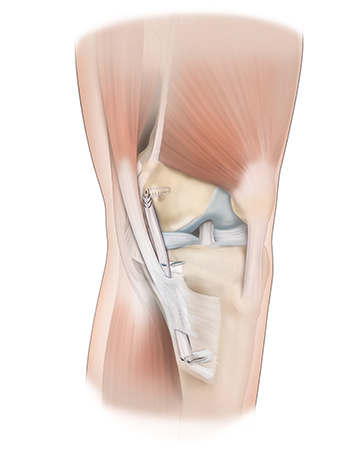MCL Injuries Surgical Treatment
What are the surgical options for an MCL injury?
When there is a complete tear of the MCL (Grade 3) or when all the structures of the posteromedial corner of the knee are injured, surgery should be performed within two weeks after injury and once range of motion has been recovered. This is the best time to repair the structures because significant scarring and tissue weakening has not yet occurred. The position and alignment of the knee can also be anatomically restored during that time frame, rather than delaying and allowing the knee to heal in an abnormal position. Recent reconstruction techniques have allowed many patients to get back to high-level activities.
Restoring the native anatomy of the MCL and posteromedial corner can allow for early postoperative range of motion and produce better outcomes. There are multiple techniques described to do this, including augmentation procedures (meaning that a graft is utilized to supplement your own tissue) or full reconstruction. Full reconstruction includes use of a graft to reconstruct the MCL or all the components of the posteromedial corner (MCL and POL), depending on the degree of the injury.

While many MCL injuries heal without surgery, severe cases involving complete ligament tears or chronic instability may require surgical intervention. Board-certified orthopedic knee surgeon, Dr. Jorge Chahla, specializes in MCL repair and reconstruction procedures, using advanced techniques to restore knee stability. If you have an MCL injury that has not responded to conservative treatments, Dr. Chahla can determine whether surgery is the best option for your recovery. Contact his office in Chicago, Naperville, or Oak Brook to schedule a consultation.
- Triple fellowship-trained sports medicine surgeon
- Performs over 800 surgeries per year
- Associate professor of orthopedic surgery at Rush University
- Learn more
